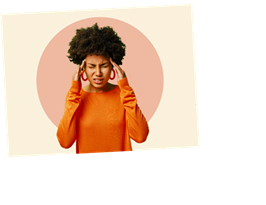For the nearly 38 million Americans experiencing migraines, the pain, sensitivity and nausea they’re experiencing is something that can very easily leave them unsure of what to do when they feel an attack coming on. There’s plenty written about ways to practice self-care to manage chronic migraines and best practices for avoiding migraine-triggering situations but, ultimately, when you’re in the midst of a terrible migraine, you need simple and easy-to-understand actions you can take to relieve your pain and safely ride it out.
If you’re dealing with migraines (whether as a seasoned reluctant headache expert or a newcomer), here’s some expert-approved advice on what to do the next time you feel one coming on.
Take your meds & link up with your support system
“Whatever your coping mechanisms are, it’s advisable to take your prescribed medication as quickly as possible, but then move onto other proven strategies that may be unique to your symptoms,” according to the American Migraine Foundation (AMF).
If you’re at work or away from home or in a situation that makes it harder to practice the self-care you need, it helps to have a support system at-the-ready to make sure you can safely get to a place where you can take care of yourself. You don’t need to go it solo: “When it comes to getting home, grab a taxi or ask a friend or your office advocate for a ride,” per the AMF. “Do not drive, and avoid public transportation. Migraine attack can intensify quickly and driving could be very dangerous.”
Make your environment as friendly and soothing as possible
Migraines aren’t known for cropping up at convenient times and certain everyday things from light to sound to smells can trigger you or make your experience more difficult to manage. So one of the first things you want to do when you feel one coming on is to try and reduce the triggers in your immediate environment and make yourself as comfortable as possible: “Turn off the lights. Migraines often increase sensitivity to light and sound. Relax in a dark, quiet room,” according to the Mayo Clinic. “Sleep if you can.”
Try temperature therapy
Using hot or cold compresses, warm showers or baths are a great way to introduce temperature therapy and see if they might help relieve your symptoms.
“Ice and heat can be used to lessen the pain of headaches. In general, most sufferers with migraine headache prefer cold packs. Sufferers with tension-type or muscle contraction headaches may prefer warm packs. It depends on the individual sufferer. The same cold or warm principles apply to showers,” according to the National Headache Foundation. “Caution should be exercised in using warm packs or showers to ensure that they are not too hot. Overly hot showers or packs can sometimes cause the opposite effect desired by inducing muscle spasm and, in extreme cases, cause burns. Do not fall asleep with a heating pad on. Alternate ice for 15 minutes on, 15 minutes off.”
Don’t skimp on meals or hydration — but avoid anything that you know might trigger you
You already know you’re not you when you’re hungry or thirsty, but skipping out on meals and your daily water intake can also be a major trigger for migraine sufferers, according to the AMF, and maintaining your healthy eating and drinking schedule is crucial (even if you’re experiencing an attack).
“If you can identify specific food triggers, be sure to avoid them as much as possible. Many people also adopt a migraine diet that eliminates foods and ingredients known to trigger a migraine,” per the AMF. The Physicians Committee for Responsible Medicine recommends introducing “pain-safe” foods that “virtually never contribute to headaches or other painful conditions.”
Some of these foods include:
- Rice
- Cooked Green Vegetables
- Cooked Orange Vegetables
- Cooked Yellow Vegetables
- Cooked or Dried Non-Citrus Fruits
They also say that about 1/3 of people living with migraines count dehydration as a major trigger.
“For some, even the slightest hint of dehydration can be the fast track to debilitating head pain. Dehydration affects the body on all levels and can cause dizziness, confusion and can even become a medical emergency,” they note, but also add that “Sometimes an attack can be stopped in its tracks by simply drinking a glass of water.”
Before you go, check out our favorite products to help you sleep a bit better:
Source: Read Full Article


